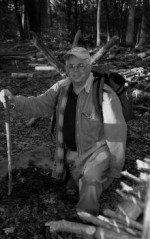Stephen Kiernan speaks on ‘end of life’
Where are you going to die? What music will you be listening to as you take your last breath? Who will be there to say goodbye to you? Author Stephen Kiernan spoke to two groups of Castleton students last Thursday to let them know that with modern day medical advances they can control the answers to the above questions. And with the right choices, they can actually have the ability to predict their death to a point.
“I found the way we die in America changed dramatically and the way we care for people dying not changing at all,” Kiernan said. “I found people suffering needlessly.”
Kiernan, a former Burlington Free Press reporter, recently wrote a book entitled “Last Rights” to raise people’s awareness on death and the options open to them. He wrote the book after working on a story where a doctor got way with “hastening a patient’s death.”
Most people would think that a hospital or a nursing home would be reasonable places to die, but statistics show otherwise.
“[The book] will radically change the way people face mortality,” said Castleton State College President David Wolk, a friend of Kiernan’s. “It’s an important issue that we all need to face.”
Research shows that palliative care or hospice is cheaper and more focused on relieving the pain of the patient as well as the family. Kiernan pointed out that to die in hospitals would result in pain and bankruptcy (now the leading cause in debt). To die in nursing homes would result in humiliation and neglect. But to die in hospice or palliative care would allow one to die at home, in less pain as well as being affordable, he said.
“It’s not a morbid thing,” Kiernan said. “It’s a freedom thing.”
Why then are so many still dying in hospitals and nursing homes?
Because Medicare will not allow it to be affordable and the doctor will have to tell the patient that they will die within six months, which is psychologically damaging to the patient as well as the family. Kiernan is convinced that if people push to receive hospice or palliative care, then health officials would have to listen and it would become more available to the population.
“Contrast writhing or winning,” Kiernan said.
Kiernan was advising his audience to get advance directives so family members will be aware of what preventive measures they want to have instigated and when to pull the plug. Few are aware that by the time they turn 18, their parents have no say so in medical care so if an accident were to happen, he said. The parents have no right to make any medical decisions – unless they are listed as the person able to make these decisions on the advance directive.
Planning ahead will ensure a dignified death rather than causing a family to be torn apart as in the Terri Schiavo case, he said. Advance directives will allow “people [to die] as they lived,” he said.
“Three or four people said it gave them something to think about,” Kiernan said of his encounters with people on campus. “One faculty member told me he was going to talk to his mother tonight.”
Sometimes hope is a good thing, but not when it depends on a miracle to make a patient be well, he said, continuing that several times an “attachment to miracles is not love.” To give false hope to a family who has a terminally ill member will hurt them worse in the end; yet that is what most hospital deaths turn into.
“Make your priority peace and compassion,” Kiernan said.
End of life care is an important factor that many people overlook.
“My outlook on death was quite similar,” Chris Grassley said. “It helped reinforce that factor.





